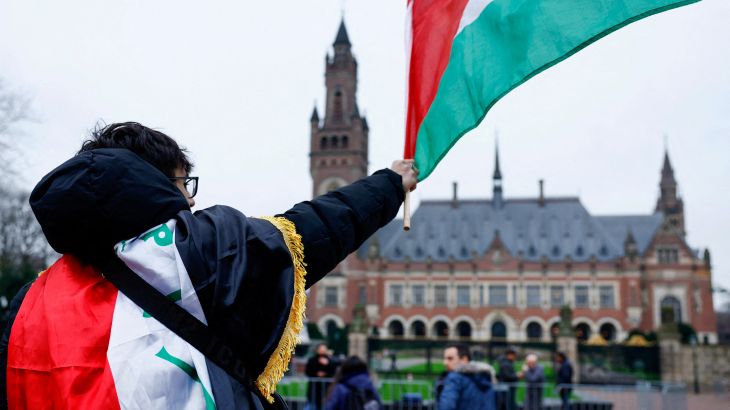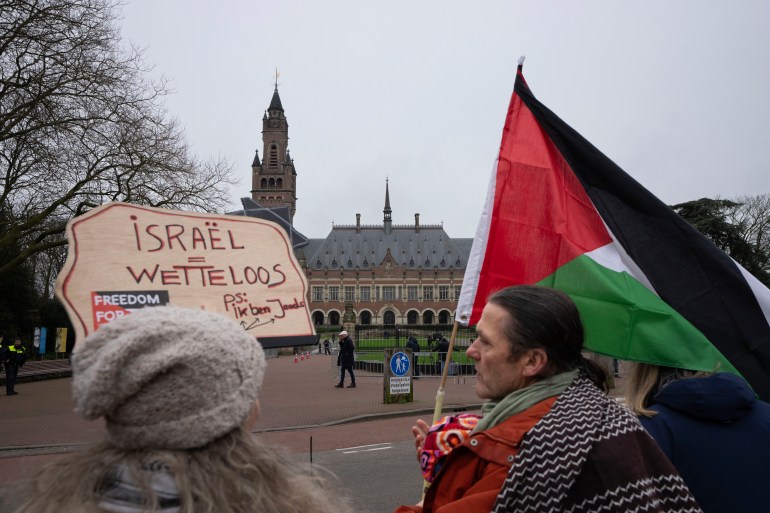China tells ICJ justice ‘must not be denied’ to Palestinians
Representatives from Ireland, Japan, and Jordan present their arguments at the ICJ hearing on Israel’s occupation of the Palestinian territories.

China has told the International Court of Justice (ICJ) that the Palestinians “must not be denied” justice at a hearing on the Israeli occupation of the Palestinian territories.
“Justice has been long delayed, but it must not be denied,” China’s Foreign Ministry’s legal adviser Ma Xinmin told the court in The Hague in the Netherlands on Thursday.
Keep reading
list of 3 itemsUS tells ICJ Israel should not be ordered to immediately end occupation
Russia tells ICJ Israel must stop all settlement activities
“Fifty-seven years have passed since Israel began its occupation of the OPT (Occupied Palestinian Territories). The unlawful nature of the occupation and sovereignty over the occupied territories remain unchanged,” he said.
Al Jazeera’s Step Vaessen, reporting from The Hague, said China used its time at the ICJ to counter the United States’ argument on Wednesday that Israel should not be ordered to unconditionally withdraw from the occupied territories without security guarantees.
“The US said the United Nations and the ICJ should stay out of a bilateral issue between Israel and Palestine. According to China, it was definitely a matter for the UN to talk about the self-determination of the Palestinian people,” Vaessen said.
“The Chinese representative said Israel is a foreign nation occupying Palestine, so the right to self-defence lies more with the Palestinians than with the Israelis.”
On Thursday, representatives from the Republic of Ireland, Japan, and Jordan also presented their arguments at the ICJ.
Ireland said it concluded that “Israel has committed serious breaches of a number of peremptory norms of general international law”.
The Irish representative added that Israel had also breached the basic rules of international humanitarian law.
The legal adviser for Japan’s Foreign Ministry, Tomohiro Mikanagi, also told the ICJ that his country believes a “two-state solution where Israel and the future independent Palestinian state live side by side in peace and dignity remains the only viable path for both peoples”.
For Jordan, Michael Wood said that “the only way for the [Palestinian] right to self-determination to be exercised is for the [Israeli] occupation to come to an end”.
Al Jazeera’s Hamdah Salhut, reporting from occupied east Jerusalem, said Jordan holds a “key position” at the ICJ hearing as it is one of the most prominent critics of the occupation and is also the custodian of the Al-Aqsa Mosque compound in Jerusalem.
“While they have been not only critics of the occupation, they’ve been critics of Israel’s war on Gaza, so their role within the region is quite crucial for aiding the Palestinians in any sort of conversations,” she said.

The ICJ is hearing from about 50 countries on their opinion about the occupation and is part of a push by Palestinians to get international legal institutions to examine Israeli policy.
On Monday, Palestinian representatives asked the judges to declare Israel’s occupation of their territory illegal and said its opinion could help reach a two-state solution.
In the occupied West Bank, tensions between illegal settlers and Palestinians intensified significantly due to Israel’s war on Gaza.
On October 7, a Hamas attack killed 1,139 Israelis, according to Al Jazeera’s tally of Israeli figures. In response, Israel’s deadly offensive on Gaza has killed about 29,000 Palestinians.
Israel, which is not participating in the hearings, said in written comments that the court’s involvement could harm achieving a negotiated settlement.
The judges are expected to take roughly six months to issue an opinion.